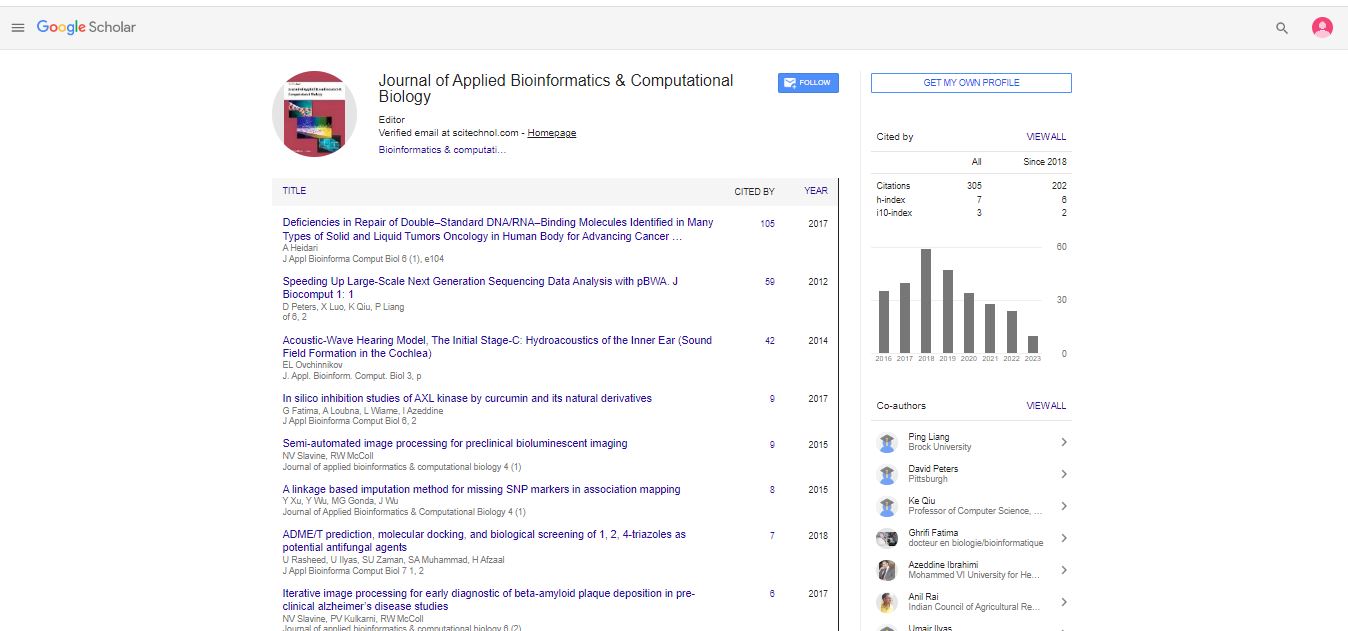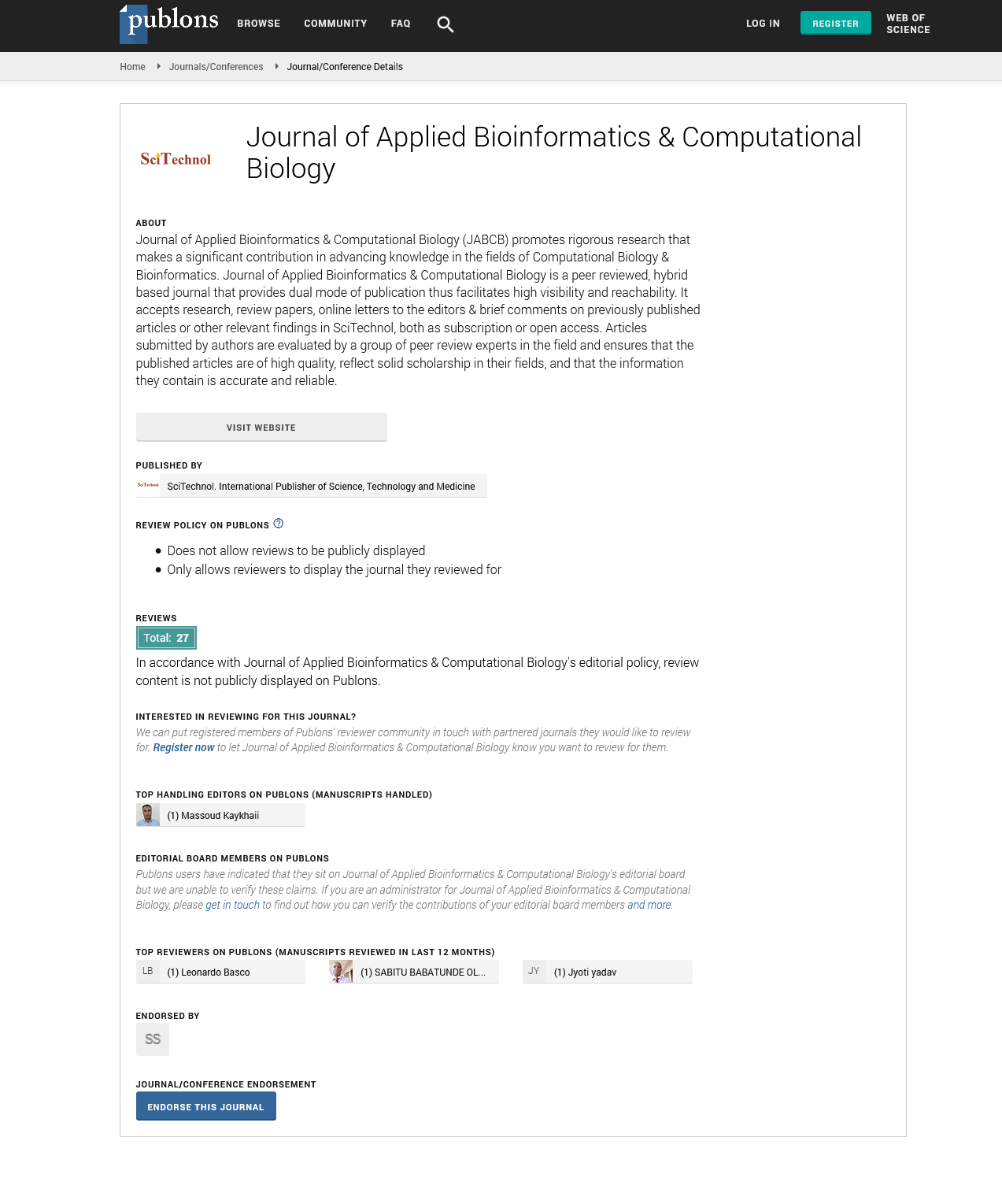Short Communication, Vol: 12 Issue: 5
Biotechnology and Drug Discovery: Merging Science and Medicine
Yenew Harris*
1Department of Structural, Geotechnical and Building Engineering, Politecnico di Torino, Corso Duca degli Abruzzi, Italy
*Corresponding Author: Yenew Harris
Department of Structural, Geotechnical
and Building Engineering, Politecnico di Torino, Corso Duca degli Abruzzi, Italy
E-mail: Yenew.harris@pol.it
Received date: 27 September, 2023, Manuscript No. JABCB-23-120178;
Editor assigned date: 29 September, 2023, Pre QC No. JABCB-23-120178 (PQ);
Reviewed date: 13 October, 2023, QC No. JABCB-23-120178;
Revised date: 20 October, 2023, Manuscript No. JABCB-23-120178 (R);
Published date: 27 October, 2023, DOI: 10.4172/2327-4360.1000284
Citation: Harris Y (2023) Biotechnology and Drug Discovery: Merging Science and Medicine. J Appl Bioinforma Comput Biol 12:5.
Abstract
Description
Biotechnology has emerged as a transformative force in the field of medicine, revolutionizing drug discovery and development. This interdisciplinary science harnesses the power of living organisms, cellular and molecular processes, and cutting-edge technologies to create innovative solutions for various medical challenges. In the realm of drug discovery, biotechnology plays a pivotal role, offering new insights, tools, and methodologies that have accelerated the development of novel therapeutic agents. This essay explores the symbiotic relationship between biotechnology and drug discovery, shedding light on the profound impact this merger has had on advancing healthcare [1].
Biotechnology, at its core, involves the manipulation of biological systems and organisms to develop products and technologies that address human needs. In drug discovery, biotechnological approaches have redefined the traditional methods, offering a more nuanced and targeted way to understand diseases and develop effective treatments. The utilization of recombinant DNA technology, genomics, and proteomics has allowed researchers to delve into the intricacies of molecular pathways, identify disease biomarkers, and design drugs with enhanced specificity. One of the hallmarks of biotechnology in drug discovery is the use of genetically engineered organisms to produce therapeutic proteins and antibodies. This has significantly impacted the production of biopharmaceuticals, offering safer and more effective alternatives to traditional small molecule drugs. The development of monoclonal antibodies, for instance, has opened new avenues for treating various diseases, including cancer, autoimmune disorders, and infectious diseases. The advent of genomics, fueled by biotechnological advancements, has ushered in an era of personalized medicine. The Human Genome Project marked a milestone in deciphering the complete human genetic code, enabling scientists to understand the genetic basis of diseases. This wealth of genomic information has facilitated the identification of genetic variations associated with susceptibility to diseases and response to specific drugs [2-4].
In drug discovery, genomics plays a crucial role in target identification and validation. By analyzing the genetic makeup of individuals, researchers can identify specific molecular targets that are implicated in disease pathways. This information is invaluable in designing drugs that are tailored to the genetic profile of individual patients, maximizing efficacy and minimizing adverse effects. Personalized medicine, made possible by the integration of biotechnology and genomics, represents a paradigm shift in healthcare, moving away from a one-size-fits-all approach to a more precise and patient-centric model [5-7].
Biotechnology has also facilitated the development of High- Throughput Screening (HTS) technologies, allowing researchers to rapidly test thousands of compounds for their biological activity. Automation plays a key role in HTS, streamlining the drug discovery process and increasing the efficiency of identifying potential drug candidates. This accelerated pace is essential in the race against time, particularly in the context of emerging infectious diseases and other urgent healthcare challenges. Combinatorial chemistry, another biotechnological tool, enables the synthesis of large libraries of diverse chemical compounds. These libraries can be systematically screened to identify molecules with therapeutic potential. The integration of biotechnology with these high-throughput approaches has transformed drug discovery from a slow and labor-intensive process into a more dynamic and efficient endeavor. While biotechnology has revolutionized drug discovery, it also presents challenges and ethical considerations. The rapid pace of technological advancements raises concerns about the ethical implications of manipulating the genetic code and creating designer drugs. The affordability and accessibility of personalized medicine also pose challenges in ensuring equitable healthcare distribution [8,9].
Biotechnology's integration into drug discovery has propelled medicine into a new era of innovation and personalized care. The synergy between science and medicine, facilitated by biotechnological tools and methodologies, has accelerated the development of novel therapeutic agents. As we navigate the ethical and logistical challenges, the promise of biotechnology in revolutionizing healthcare and improving patient outcomes remains a beacon of hope for the future. The merging of science and medicine through biotechnology is not just a milestone; it is a dynamic journey towards a healthier and more personalized future [10].
References
- Feinstein AR (1977) Clinical biostatistics. Clin Pharmacol Ther 22(4): 485-98
- Chan YH. (2003) Biostatistics 104: correlational analysis. Singapore Med J 44(12): 614-9
- Chan YH. (2003) Biostatistics 101: correlational analysis. Singapore Med J 44(12): 614-9
- Reiczigel J, Marozzi M, Fabian I, Rozsa L (2019) Biostatistics for parasitologists–a primer to quantitative parasitology. Trends Parasitol. 35(4): 277-81
- Overholser BR, Sowinski KM (2008) Biostatistics primer: part 2. Nutr Clin Prac 23(1): 76-84
- Simpson JA (1971) Bancroft's introduction to biostatistics. J. Neurol. Neurosurg. Psychiatry. 34(2): 208
- Chan YH. (2003) Biostatistics 202: correlational analysis. Singapore Med J 44(12): 614-9
- Chakrabarty D (2019) Association of statistics with biostatistics research. Biom. biostat. int. Biometrics 8(3): 104-9
- Glantz SA (1980) Biostatistics: how to detect, correct and prevent errors in the medical literature. Circulation 61(1): 1-7
- Breslow N (1990) Biostatistics and bayes. Stat Sci 5(3): 269-84
 Spanish
Spanish  Chinese
Chinese  Russian
Russian  German
German  French
French  Japanese
Japanese  Portuguese
Portuguese  Hindi
Hindi 
